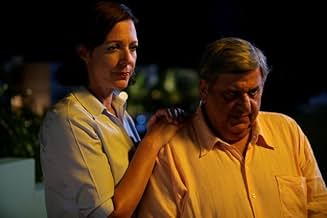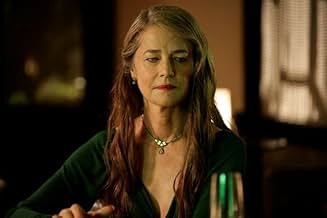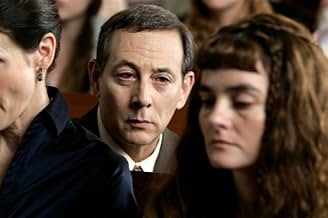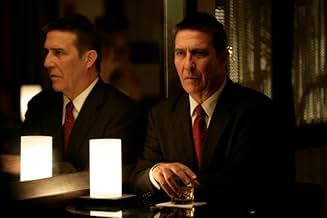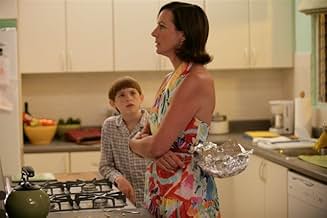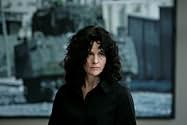Life During Wartime
- 2009
- Tous publics
- 1h 38min
Ajouter une intrigue dans votre langueFriends, family, and lovers struggle to find love, forgiveness, and meaning in an almost war-torn world riddled with comedy and pathos.Friends, family, and lovers struggle to find love, forgiveness, and meaning in an almost war-torn world riddled with comedy and pathos.Friends, family, and lovers struggle to find love, forgiveness, and meaning in an almost war-torn world riddled with comedy and pathos.
- Réalisation
- Scénario
- Casting principal
- Récompenses
- 3 victoires et 9 nominations au total
- Wanda
- (as Gaby Hoffman)
Avis à la une
This is a less consistent film than its predecessor, particularly in terms of tone. Happiness harboured an almost garish John Waters trash aesthetic, whereas Wartime often shifts into something more sombrely lit and handsome, even entering noir territory at times, as when Ciaran Hinds' Bill and Charlotte Rampling's Jacqueline meet in a whisky-coloured bar to do semantic battle before indulging in a bout of loveless sex.
The characters are mostly horror movie monsters masked in the fascia of suburban admissibility - none more so than Trish (Allison Janney), the selfish mad-mom who is delighted by the fallacy of the nuclear ideal, lusting after "normal". Her son, Timmy (Dylan Riley Snyder), is the traumatised voice of reason: a humanist on the cusp of corruption. Then there is Joy (Shirley Henderson), a deep-feeling adult alone amidst the animal chaos: frail, fragile and bereft (in mind and body); in search of absent metaphysical guidance; a closed book desperate to do good; desperate to stop pretending any more.
Loneliness, rape, suicide and despair all echo in a bubble of carefully constructed sentimentality. Wartime doesn't quite carry the joke all the way. Certain latter scenes, particularly involving Hinds' recently-released Bill, are played disconcertingly straight. But then this is a film about the pathology of forgiveness (the film's former title), the corrosive nature of trauma, and the final consolation of repression and faith - themes in which perhaps even Mr Solondz couldn't find the humour.
"You die for me and I will know you love me," says Allen (The Wire's Michael Kenneth Williams) from the grave. No one in American cinema is better than Solondz at highlighting fickleness and absurdity of human interaction, and the paradoxes we contrive for ourselves. And although it can be wearying to endure such an indictment, we will always need filmmakers willing to float like faecal matter in Hollywood's homogenous soup.
I'm not sure if this is really supposed to be a sequel to Happiness in the normal sense, but yes, a lot of the characters from that one are back. Sadly Solondz has turned Joy from a half dysfunctional "loser" to a freak, and every scene with her is pretty unbearable. The dad from the first film has also changed a lot, but that makes sense seeing how he's been in prison for years when the film starts.
Palindromes sort of drowned in gloom and repulsion. LDW isn't quite the same but it's still bleak, and often creepy. At times it borders to psychological thriller.
I have to respect Solondz for making a philosophical effort, but if there was a specific point with the story, I didn't quite get it. There's the subject of fear and hysteria in the U.S all over, but other than that, I didn't get that much out of it. All in all it was like a (expectedly) weirdish film with a lot of darkness and absurdity. Happiness and Storytelling were dark but also very funny and balanced with a sort of pleasantness that I just can't see here. It's like a long nightmare.
Before Palindromes Solondz was to me possibly the greatest living director. I REALLY hope he either gets back to his old form or tries out something new that works better.
All the actors in the new film were much paler than the ones playing the same parts in "Happiness". The only appealing one was Shirley Henderson playing Joy (even if I missed Jane Adams dearly). The one playing Trish was nowhere near as good as the original actress, but the part was not as funny either.
Why make a follow up movie without the original cast? It would have been great to see them having aged like their characters. I suppose the actors from Happiness didn't like the script for "Life during Wartime"!
Le saviez-vous
- AnecdotesA sequel to Todd Solondz's movie Happiness (1998), but with entirely re-cast characters.
- GaffesThe plane has no name or identifying number on its outside, as mandated by ICAO, the international aviation agency.
- Citations
Trish: So Mark, what do you do?
Mark Wiener: Systems analysis.
Trish: That sounds interesting.
Mark Wiener: It is to me, moderately. Like intermediate level Sudoku; but I have no illusions that what I do is of interest to anyone else. Even among specialists I'm something of functionary, but without ambition, or even hope of ambition. I plateaued in grad school then lost interest except in maintaining a base salary adequate to financing a low overhead subsistence.
- Bandes originalesExcerpts from the original motion picture Score to Happiness
Composed by Robbie Kondor
Meilleurs choix
- How long is Life During Wartime?Alimenté par Alexa
Détails
- Date de sortie
- Pays d’origine
- Site officiel
- Langue
- Aussi connu sous le nom de
- Untitled Todd Solondz Project
- Lieux de tournage
- Société de production
- Voir plus de crédits d'entreprise sur IMDbPro
Box-office
- Budget
- 4 500 000 $US (estimé)
- Montant brut aux États-Unis et au Canada
- 281 447 $US
- Week-end de sortie aux États-Unis et au Canada
- 30 507 $US
- 25 juil. 2010
- Montant brut mondial
- 807 162 $US
- Durée1 heure 38 minutes
- Couleur
- Mixage
- Rapport de forme
- 1.85 : 1
Contribuer à cette page





